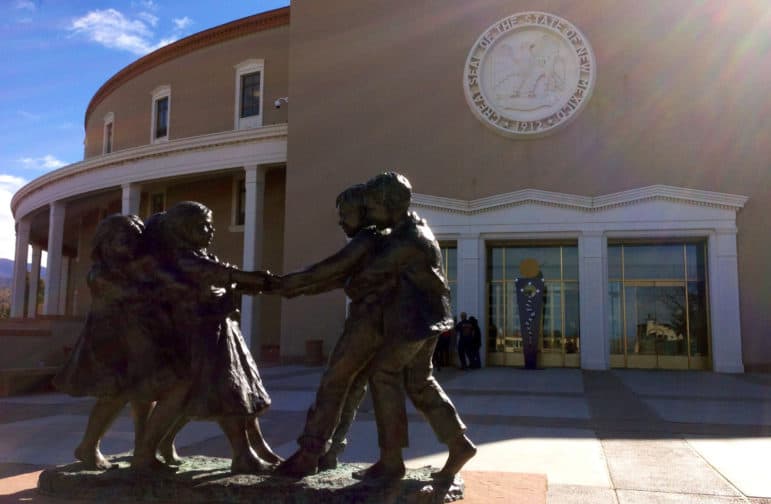
Heath Haussamen / NMPolitics.net
A statue outside the Roundhouse in Santa Fe.
TAOS — The interim Legislative Finance Committee heard the latest rosy budget projections on Wednesday, which show revenues from booming oil and gas activity leading to $1.17 billion in new money for the next fiscal year, bringing total revenue to $7.3 billion.
But analysts cautioned the surplus is the result of increasing reliance on oil and gas revenues — which are notably volatile. Because of this, they recommended setting aside at least 20 percent of the revenue in reserves in case of another crash in the oil and gas market or a recession.
Legislators will decide during next year’s legislative session what to do with the revenues.
In the past, when oil and gas prices fell, previous reserves weren’t enough to make up for the losses and legislators had to cut the state budget.
Senate Finance Committee chairman John Arthur Smith, D-Deming, noted that last year the state dug into funds earmarked for purposes other than running the government, such as the Tobacco Settlement Permanent Fund and the Water Project Fund to fill a deficit.
Smith said the state should replenish these funds.
Smith, a budget hawk, holds powerful sway over the budget process and echoed warnings that these spikes in revenues from oil and gas often come from valleys.
Jon Clark, the chief economist for LFC, warned that previous spikes in oil and gas activity and revenue were followed by significant decreases. And because of the increasing reliance on the volatile source, that means the potential for a steep drop is even higher.
“We can see another revenue hit of the same magnitude (as a decade ago) because of a bust in oil and gas,” Clark said, even absent a recession.
Moody’s Investor Services recommended at least 17 percent reserves when the ratings service downgraded New Mexico’s bond rating earlier this year.
John Monforte, the secretary-designate of the Taxation and Revenue Department, said the recently-enacted rainy day fund and expanding reserves are “probably the best solution to the volatility that our present economy has.”
The rainy day fund takes revenues from oil and gas that exceed the average over the last five years and places them into an already-existing tax stabilization fund that can be used when the state needs money during a deficit. Like nearly all states, New Mexico’s constitution requires an annually balanced budget, so it cannot run deficits in down years, as the federal government can.
A recession, the estimate said, was unlikely within the next year. But the LFC report noted that economists polled in the Wall Street Journal were more likely to say a recession could occur in 2020 or 2021.
Oil and gas revenues are driven primarily by the global price of oil, as noted by the Department of Finance and Administration report. And natural gas supplies could be impacted by the oil production surge — the oil production results in additional natural gas supplies.
New Mexico also doesn’t have control over tariffs and other international trade decisions by Washington, D.C. Pecan farmers, for example, could go out of business because of the impact on prices from recent tariffs and a trade war between the U.S. and China and other countries.
“Part of the risk to anything we’re talking about this morning is the whole risk of international trade and what happens there,” Department of Finance and Administration Secretary Duffy Rodriguez said. “It can have a direct impact on our economy and the stabilization of the global economy.”
Personal income tax income also increased by $54 million this year, partly because of increased employment, but also because of the federal tax bill passed last year. The federal tax bill resulted in higher state taxes for those with three or more children.
One potential new source of revenue is taxes on internet sales. In a recent decision, the U.S. Supreme Court paved the way for states to levy taxes against internet companies that do not have a “nexus” in that state, under certain restrictions.
Gov. Susana Martinez vetoed legislation that would have imposed such a tax on large online retailers in recent legislative sessions.
“I think New Mexico will require some type of legislative change in this next session,” Monforte told legislators.
Democratic gubernatorial candidate Michelle Lujan Grisham attended the first part of the hearing and told legislators she was very interested in the budget projections. The next governor will be in office when the Legislature crafts a new budget with the new funds.
The LFC will hear the next consensus budget estimate on Dec. 1, which is after the gubernatorial election and six weeks before the start of the legislative session.
This article originally referred to John Monforte as John Manafort. NM Political Report regrets the error.